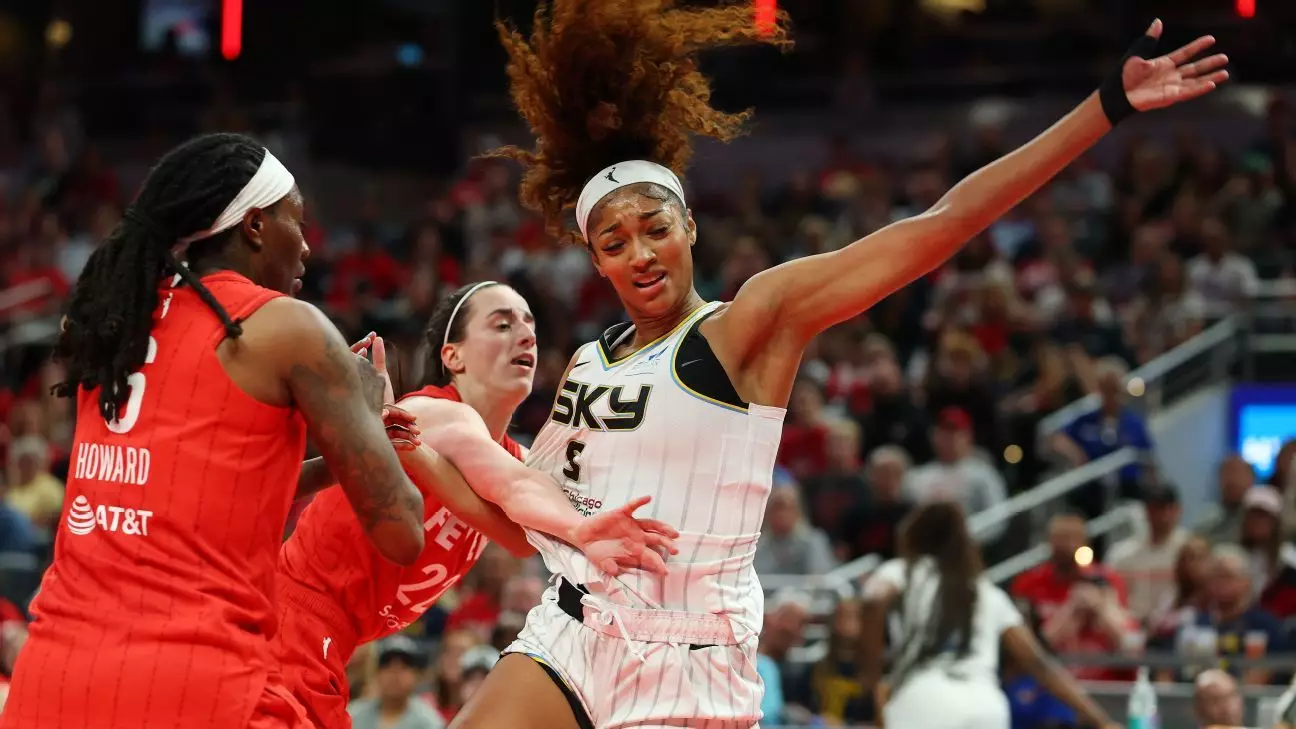The recent incident involving Angel Reese during a WNBA game has ignited a firestorm of conversation, one that transcends mere fouls and technical calls. This occurrence not only highlights the visceral nature of competitive sports but showcases how toxic fandom can rear its head, rendering a space—meant to be inclusive and empowering—into a cauldron of hate. The WNBA’s ongoing examination of “hateful fan comments” amidst this incident between Reese and Caitlin Clark needs to be viewed as a definitive turning point in how sports organizations handle issues of racism and discrimination.
The game, where the Indiana Fever trounced the Chicago Sky 93-58, should have thrilled fans with its athleticism and competitiveness. Instead, it became marked by bitter jeers directed toward Reese, culminating in a disheartening exhibition of disdain from the stands as she prepared to shoot free throws. This unfortunate reality begs the question: why do some fans feel empowered to hurl vitriol, especially in a space that ought to celebrate the unifying nature of sports?
Voices in the Arena: The Role of Fans
The deep-seated issue of racism in sports manifests in many forms, often at its most damaging in the behavior of fans. This phenomenon is especially troubling in women’s sports, where athletes still battle for respect on and off the court. The WNBA’s zero-tolerance approach to hateful behavior, encapsulated in its “No Space for Hate” initiative, is not merely a brand maneuver; it symbolizes a crucial responsibility that the league must undertake to protect its players.
Yet, one must evaluate whether these efforts are merely skin-deep. The league’s strong condemnation of racism and other discriminatory actions must evolve past statements and into tangible consequences for offending fans. It’s not enough to declare that hate has no place in the league; action must be taken to back these words, lest they ring hollow. Those who delight in obscenity at a sporting event should not be treated with complacency; their behavior deserves to be admonished and penalized.
A Call to Action: League Accountability and Player Support
The WNBA — under Commissioner Cathy Engelbert — remains at a critical crossroads. With potential fans in attendance being challenged to maintain appropriate conduct, it is vital for the league to foster an environment where players, particularly women of color, feel supported and valued. The Women’s National Basketball Players Association (WNBPA) echoed this call, emphasizing the unacceptability of toxic behavior in arenas, spotlighting a collective demand for a safer, friendlier environment.
The inquiry into the fan conduct is essential, but it must also extend to examining how conflict between players, like that between Reese and Clark, may inadvertently trigger abusive behavior from spectators. While both players largely downplayed the confrontation—claiming it was merely “basketball play”—the reactions from the audience reveal a darker specter lurking beneath the surface.
Sports as a Reflection of Society
The interactions observed in arenas—ranging from joyous celebrations to malicious heckling—are often reflections of the broader societal climate. As the WNBA navigates this sensitive issue, the league has an unprecedented opportunity to lead the way in addressing not only the concerns of its athletes but also the fans who claim to support them. Ignoring these underlying societal dynamics risks perpetuating a cycle of negativity that can sour the spirit of competition.
As sports become ever more professionalized and commercialized, the responsibility of maintaining a community that celebrates diversity and inclusion rests on the institutions that govern them. The WNBA, by virtue of its position in women’s sport, is uniquely equipped to challenge norms and advance a message of respect, not just among players, but within the fan base as well.
We must question whether the WNBA is ready to harness its leadership to confront these critical issues directly and actively combat hate; the answer remains to be seen. However, one thing is certain: simply stating that there is “no space for hate” does not suffice. True transformation requires comprehensive policies, education, and the unwavering commitment to ensure that every player, including individuals like Angel Reese, is treated with dignity and respect—both on and off the court.

Leave a Reply